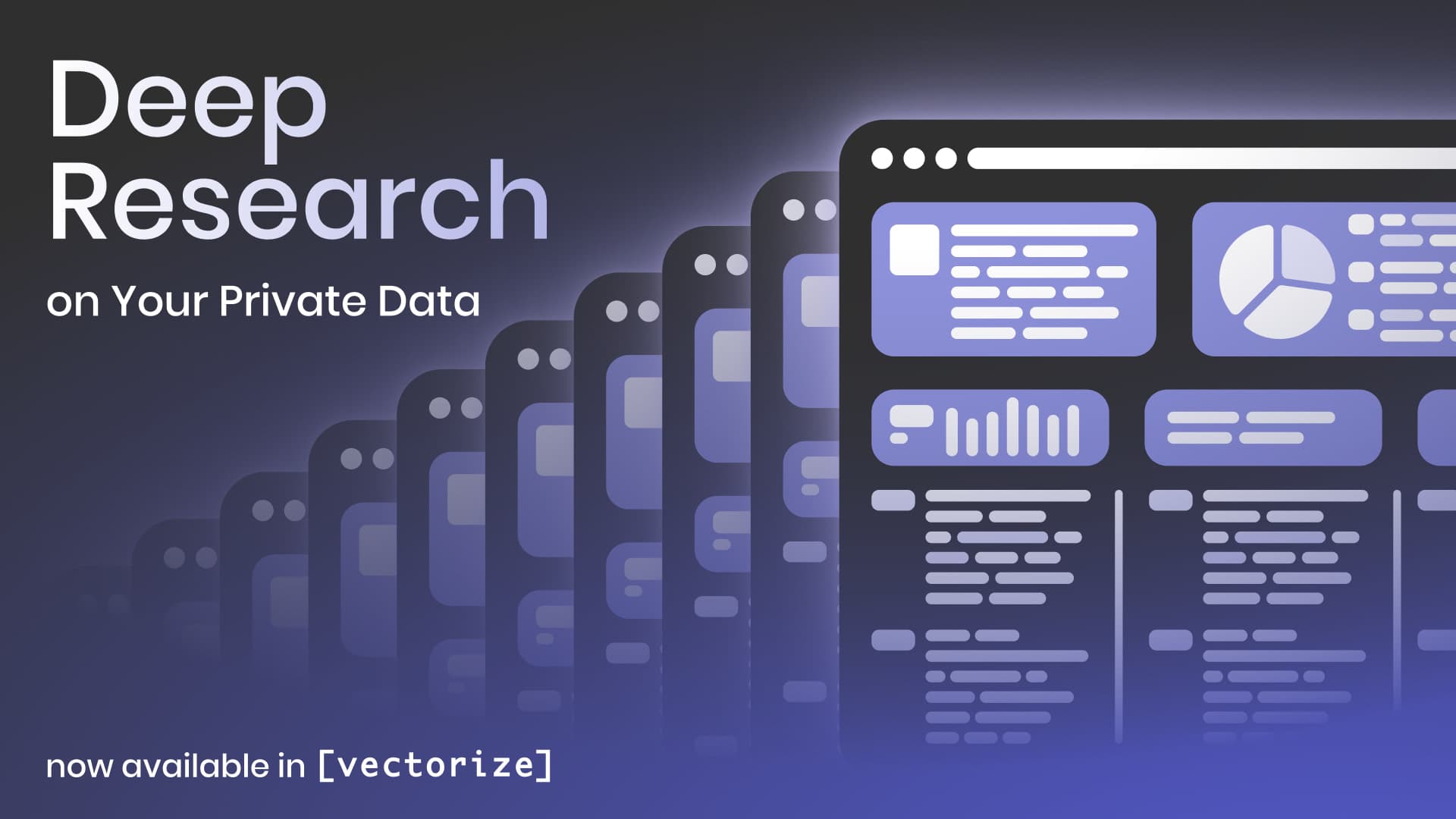Introducing Deep Research on Your Private Data

We’re excited to announce the Beta launch of Deep Research, a powerful new feature in Vectorize that transforms how organizations generate comprehensive research reports. Deep Research combines the intelligence of AI with your organization’s data to deliver structured, in-depth analysis on any topic in minutes.
What is Deep Research?
Deep Research is an AI-powered report generation tool that helps you explore and analyze information within your organization’s knowledge base. With a simple prompt and customizable report structure, Deep Research can generate comprehensive reports using your private data in minutes that could take hours or days to create manually.

The feature works by:
- Taking your research question or topic
- Analyzing relevant data from the vector database that was populated by a Vectorize pipeline
- Optionally enriching findings with web search data
- Generating a structured report following your custom template
- Delivering an AI-generated report complete with sections, subsections, and insights
Key Features
Customizable Report Structure
Deep Research gives you complete control over the structure and organization of your reports. Using the intuitive Schema Builder, you can:
- Create custom report templates with sections and subsections
- Define exactly what information should appear in each section
- Save templates for future use
- Import and export report schemas
This means your reports maintain consistent structure and organization, which can be useful for reports regularly generated in an organization, such as sales reports, competitive analysis, investment memos, etc.
Comprehensive Data Access
Deep Research has access to all the information in your Vectorize pipeline vector DB, including:
- Documents from file-based sources such as Google drive, Dropbox, and AWS S3
- External SaaS system that contain your organization’s knowledge history such as Confluence and Intercom
When enabled, the web search feature extends this to include up-to-date information from the internet, delivering a complete picture of your research topic.
Real-Time Progress Tracking
As Deep Research analyzes your data and generates reports, you can follow along with its progress. A detailed activity log shows you:
- The current phase of research
- Key sources being analyzed
- Insights being incorporated
- Overall progress toward completion
This transparency gives you confidence in the thoroughness of the research process.
n8n Workflow Integration
We’re particularly excited about the Deep Research integration with n8n, the popular workflow automation tool. This integration enables:
- Triggering research reports based on schedules or events
- Automatically sending completed reports to stakeholders
- Processing and storing research results in other systems
- Incorporating Deep Research into complex business workflows
With the integration to the n8n workflow automation tool, so you can set up automated research pipelines that continuously generate and distribute insights without manual intervention.
Benefits for Your Organization
Beyond the Chatbot: Deeper Insights into Your Private Data
Deep Research goes far beyond traditional chatbot interactions with your data:
- Instead of simple question-and-answer exchanges, get comprehensive, structured analysis
- Uncover connections and patterns across your entire knowledge base that aren’t apparent in isolated Q&A
- Receive complete context and supporting evidence, not just isolated facts
- Generate complete reports rather than conversation snippets
The depth and structure of these reports enable a level of insight that’s simply not possible with conventional chatbot interfaces.
Seamless Combination of Private Data with Web Research
Deep Research uniquely bridges your private knowledge with public information:
- Analyze your proprietary data in the context of the latest web information
- Enrich internal findings with external market trends and research
- Compare your private metrics against industry benchmarks
- Keep your confidential information secure while still leveraging public knowledge
This hybrid approach ensures you get the most complete picture possible without compromising data security.
Replace Manual Report Generation with Templates
The template-based approach of Deep Research transforms how reports are created:
- Standard report templates ensure consistency across all generated research
- Replace time-consuming manual report creation with automated generation
- Maintain organizational standards for structure and analysis
- Focus your team on acting on insights rather than formatting reports
By standardizing the report structure through templates, you fundamentally change the economics of research in your organization.
Getting Started with Deep Research
Using Deep Research is simple:
- Access the Deep Research tab in your Vectorize pipeline
- Enter your research topic or question
- Configure your report schema (or select from templates)
- Click “Start Research”
- Review the automatically generated report
For more advanced usage, including API integration and workflow automation, check out our documentation.
What’s Next
We’re committed to continuously improving Deep Research based on your feedback. In the coming months, we’ll be adding:
- Additional report templates for specific industries
- Expanded workflow integration options
- Advanced AI model options that can do more “thinking”
- Improved private retrieval using extracted structured data
Try Deep Research Today
Deep Research is available in Beta for all Vectorize customers on our latest plans. To get started, simply log in to your Vectorize account and look for the Deep Research tab in your pipeline details page.
We can’t wait to see the insights you’ll uncover with this powerful new tool!
Have questions about Deep Research? Join our upcoming webinar on March 18, 2025 at noon EST/9am PST. We’ll demonstrate this feature in action and answer your questions live. Register now.